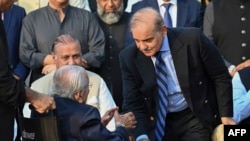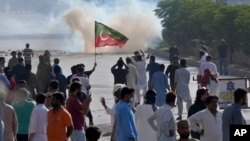Pakistan's National Assembly has been dissolved, with outgoing Prime Minister Shehbaz Sharif being replaced with an interim successor to oversee a general election due within 90 days amid economic and political crises facing the country.
The legislature was dissolved on Wednesday, three days before its five-year term was to officially end. It was the third consecutive National Assembly in Pakistan's 76-year turbulent democratic history to complete its mandated tenure.
But the upcoming vote in the country of 241 million people could be delayed for several months because the Election Commission of Pakistan, which organizes it, says it must first redraw nationwide electoral boundaries based on new census data.
Sharif led a coalition government of about a dozen parties after they jointly forced his predecessor, Imran Khan, out of power through a no-confidence vote in April 2022.
The outgoing government has been grappling with a deepening economic crisis and historically high inflation levels as Pakistan introduced tough reforms to secure a much-needed loan from the International Monetary Fund in July. Sharif defended and praised his administration for trying to tackle Pakistan's challenges despite last year's devastating flooding and rising energy prices stemming from the Ukraine war.
Critics acknowledged that years of deeply rooted economic challenges were difficult for Sharif to address during his 16-month tenure. But they denounced the government for hastily passing dozens of controversial bills in the weeks before parliament was dissolved, allegedly to appease the military.
"I think this parliament has left the state in shambles," said Hina Jilani, head of the country's independent Human Rights Commission of Pakistan.
"I think it fast descended into a mode where it seems to have surrendered to the militarization of different civilian sectors in Pakistan," she told VOA.
Jilani denounced as "abhorrent" some of the bills rushed through the parliament, saying they have further weakened an already fragile democracy in Pakistan reeling from four coups since gaining independence from Britain in 1947.
"These are legislations that curtail civil liberties, freedom of expression, and give too much control to the military to intrude into civilian affairs," she said.
The bills in question include, among others, amendments to the so-called Official Secrets Act and the Pakistan Army Act. Critics say the amended laws have criminalized defamation of the armed forces and given intelligence agencies sweeping powers to target dissidents and political rivals.
"This means the kind of political order which we should anticipate in the days to come in Pakistan — I think its foundation has been laid through these laws," said Ahmed Bilal Mehboob, president of the Pakistan Institute of Legislative Development and Transparency, an Islamabad-based independent think tank that works to strengthen democracy and democratic institutions in Pakistan.
"Probably, we are going to face a more repressive kind of a system in the future, and democratic values and human rights will be compromised," Mehboob told VOA.
He noted that the circumstances surrounding the vote of no-confidence against Khan had led to a peaceful political transition, but they also were to be blamed for "creating polarization and havoc" in the following months.
Khan's Pakistan Tehreek-e-Insaf, or PTI, party won the last general election in 2018, enabling the cricket star-turned-politician to become the prime minister and form a coalition government before he was toppled by the parliamentary vote last year.
The PTI is the largest political party in Pakistan, and the 70-year-old ousted leader remains the most popular national politician, according to public polls.
Since his removal from office, Khan has been at the center of protracted political turmoil gripping the nuclear-armed South Asian nation.
Last week, he was sentenced to three years in prison for alleged embezzlement of official gifts while in office and was subsequently banned from contesting an election for five years.
Khan has vehemently denied any wronging, accusing the powerful Pakistani military of being behind the "politically motivated" graft charges and other accusations, including terrorism, instituted over the past year. The military has denied the allegation.
The deposed Pakistani leader has been placed in a century-old British-colonial era prison west of Islamabad, notorious for its harsh conditions. Khan's party leaders and lawyers have decried what they described as a "dirty" and "insect-filled" cramped prison cell, demanding that he be granted privileges a former prime minister is entitled to under the country's prison rules.
Khan has appealed the conviction, and his attorneys appear confident they will get a favorable outcome. Analysts have warned attempts to sideline the PTI chief will cast doubt over the credibility of future elections.
The jailed Pakistani leader has consistently accused the country's former military chief, General Qamar Javed Bajwa, who stepped down last November, of colluding with Sharif and the United States to topple his government.
Politicians in Pakistan have long privately spoken about the military's role in making or breaking governments, but Khan's rare public attacks on the powerful institution prompted Bajwa to defend the army against public criticism just days before he retired in November 2022.
"In my opinion, the reason for this is the constant meddling by the army in politics for the last 70 years, which is unconstitutional," the military chief told a nationally televised event at the general headquarters in Rawalpindi.
"That is why, since February last year, the military has decided they will not interfere in any political matter," Bajwa said, though skeptics immediately dismissed his claim.
Khan alleges the current army chief, General Asim Munir, is carrying forward his predecessor's mission of cracking down on PTI supporters and other critics for questioning the army's political interference. However, critics say the army's backing was behind the ousted politician's rise to power in the last elections.
"The military intervention in civilian affairs was always kept under covers. Now, it is pronounced, it is declared," Jilani, the human rights advocate, said while assessing the working of the outgoing parliament.
Washington and the Pakistani military have denied they played a role in Khan's ouster.
An American news outlet, The Intercept, published for the first time Wednesday what it said is the text of a Pakistani diplomatic cable, which Khan has long held up as evidence of his claim that the U.S. engineered his defeat in the parliamentary no-confidence motion to punish him for visiting Russia on the eve of its invasion of Ukraine.
The U.S. State Department said Washington had objected privately and publicly to Khan's visit to Moscow but did not play a role in his removal from power.
State Department spokesman Matthew Miller, speaking at a news conference on Wednesday, argued that even if the comments in the purported cable were accurate as reported, they show the United States is expressing concern about Khan's "policy choices" rather than expressing its "preference" on who the leadership of Pakistan ought to be.








